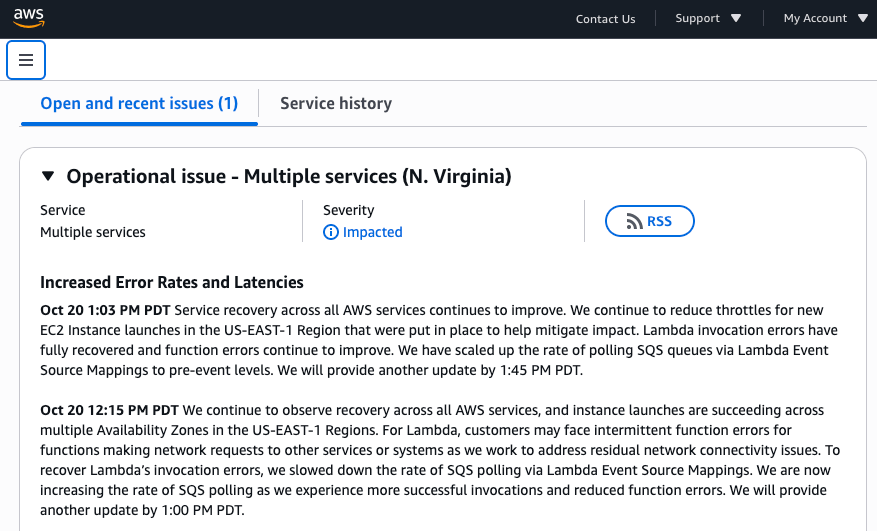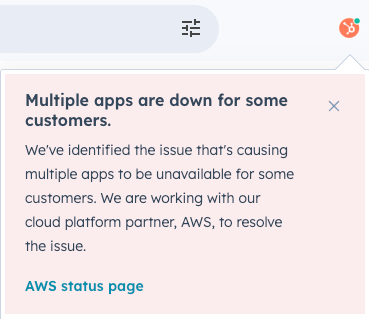If your favorite app froze this week or your login page blinked out like a bad magic trick, you weren’t imagining it. We had problems with HubSpot all day. Amazon Web Services (AWS) — the internet’s biggest backstage crew — had a meltdown. For a few hours, much of the web just… stopped.
We’re talking about the digital power plant that keeps half the internet running. When AWS hiccups, it’s not just tech startups that stumble. Big names like Fortnite, Snapchat, Venmo, and a few major banks all saw the lights flicker. That’s because AWS isn’t just Amazon’s side hustle; it’s the plumbing behind most modern websites and apps.
The chaos began early Monday morning, centered on AWS’s US-EAST-1 region (Northern Virginia). That’s basically the beating heart of their operations. Databases went down. Servers lost contact. Systems that usually hum like a well-tuned car suddenly coughed, sputtered, and stalled on the digital highway. Engineers worked fast, but the dominoes had already started falling.

The Internet’s Not Invincible
It’s easy to think “the cloud” is this mythical, all-knowing thing floating safely above our heads. It’s not. It’s just someone else’s computer — or more accurately, a few million of them in giant warehouses. They need electricity, cooling, and constant maintenance. Sometimes one hiccup cascades into another, and suddenly half your apps are toast.
Even the tech giants — the ones with budgets that make small nations jealous — can’t dodge it completely. Amazon, Google, Microsoft, Meta, WhatsApp, HubSpot… they all have battle scars from outages. This week, it’s Amazon’s turn, and not pretty.
That’s the reality of living in an always-connected world. The same systems that make our lives seamless: online shopping, mobile banking, streaming, chatting; they are also a delicate chain of interconnected parts. If one link snaps, everything else feels it.
Where Perfect Afternoon Fits In
At Perfect Afternoon, we do our best to keep things smooth, quick, and online. We use trusted partners like LiquidWeb and Cloudflare to handle parts of our infrastructure, because they’re world-class and reliable… most of the time.
But even with that, no one’s immune. Whether it’s a plugin gone rogue, a server update gone sideways, or a third-party outage like this one — it’s part of the digital ecosystem we all rely on.
Perfect Afternoon Website Uptime
That’s why maintenance matters. We take it seriously. Regular checks, software updates, security patches — the unglamorous stuff that keeps your experience running clean. It’s the digital version of checking the oil before you take a road trip.
Because here’s the thing: you can’t prevent every problem, but you can reduce how bad they get. That’s why we have layers of caching, backup systems, and a lot of monitoring. When something breaks somewhere on the internet, we aim to make sure your corner of it still feels calm.

Why This Isn’t Doom and Gloom
It’s tempting to roll your eyes and think, “So even Amazon can’t get it right?” But that’s missing the point. Technology isn’t static — it’s evolving. Systems are getting bigger, more connected, and yes, more complicated. Every outage teaches engineers something new about how to prevent the next one.
Think of it like flying. Airplanes didn’t become the safest way to travel overnight. It took decades of small failures, investigations, and improvements. The same is true for cloud computing — only instead of wings and engines, it’s APIs and databases. This is true for WordPress, WooCommerce, plugins and more.
The real takeaway? Outages aren’t proof that technology is unreliable. They’re proof that technology is alive — constantly adapting, improving, and learning from its own mistakes.
The Ounce of Prevention Rule
We’ll keep doing what we’ve always done: stay alert, stay maintained, and stay honest with you when things happen. We believe that being transparent beats pretending everything’s perfect.
Because, let’s face it — even the best-run digital platforms can have a bad day. And when the internet catches a cold, it doesn’t mean the system’s broken. It just means it’s human — well, as human as a few million data servers that run large public systems can be.
So if the web feels a little wobbly once in a while, know this: it’s not just you, and it’s not just us. It’s everyone, learning how to keep this big, beautiful mess running.
